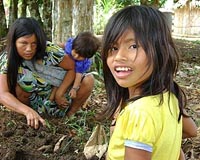| . |  |
. |
Davis, Calif. (UPI) Dec 3, 2009 A U.S. gerontologist says genetic advantages allow us to outlive our ape ancestors, although we are more susceptible to diseases of aging. In spite of their genetic similarity to humans, chimpanzees and great apes have maximum life spans rarely exceeding 50 years. The difference, says University of Southern California-Davis Professor Caleb Finch, is as humans evolved, their genes enabled them to better adjust to levels of infection and inflammation and to the high cholesterol levels of meat rich diets. Finch said such evolutionary genetic advantages, caused by slight differences in DNA sequencing, also make humans uniquely susceptible to diseases of aging, such as cancer and heart disease. In addition to differences in diets, he said humans evolved unique variants in a cholesterol transporting gene, apolipoprotein E, which also regulates inflammation and many aspects of aging in the brain and arteries. ApoE3 is unique to humans. But the minor allele, apoE4, when expressed in humans, can impair neuronal development, as well as shorten human lifespan by about four years and increase the risk of heart disease and Alzheimer disease by several-fold, he said. "The chimpanzee apoE functions more like the "good" apoE3, which contributes to low levels of heart disease and Alzheimer's," Finch said. He hypothesizes the expression of ApoE4 could be the result of the antagonistic theory of aging, in which genes selected to fight diseases during early life have adverse affects in later life. The study appears in the early online edition of the Proceedings of the National Academy of Sciences. Share This Article With Planet Earth
Related Links All About Human Beings and How We Got To Be Here
 Amazon tribe in Peru warns it's close to extinction
Amazon tribe in Peru warns it's close to extinctionLima (AFP) Dec 1, 2009 The Candoshi people in Peru's northern Amazon jungle are close to extinction from a hepatitis B infection that has gone unchecked since 2000, tribal leaders and health officials said Tuesday. "My people are suffering, we're in real danger of extinction," said Candoshi chief Venancio Ucama Simon. Standing next to a Candoshi woman suffering from hepatitis-induced cirrhosis who doctors said ... read more |
|
| The content herein, unless otherwise known to be public domain, are Copyright 1995-2009 - SpaceDaily. AFP and UPI Wire Stories are copyright Agence France-Presse and United Press International. ESA Portal Reports are copyright European Space Agency. All NASA sourced material is public domain. Additional copyrights may apply in whole or part to other bona fide parties. Advertising does not imply endorsement,agreement or approval of any opinions, statements or information provided by SpaceDaily on any Web page published or hosted by SpaceDaily. Privacy Statement |